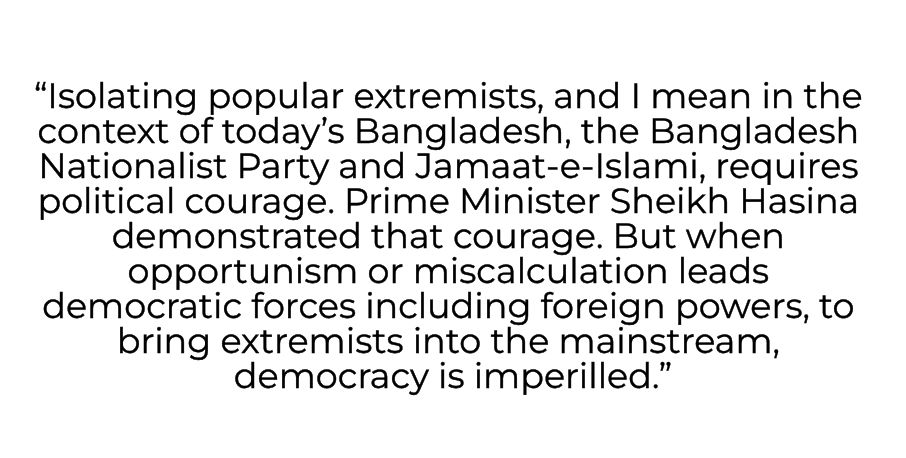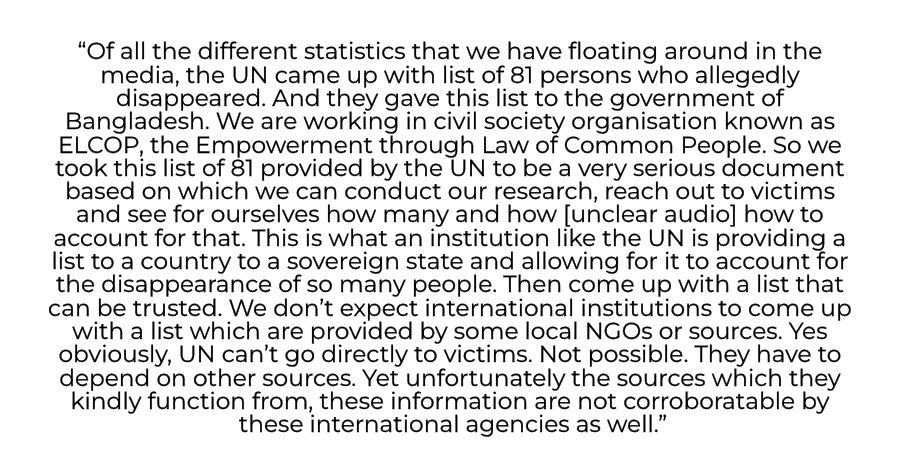When Bangladesh’s “fake” civil society discredits the opposition and real human rights violations
Dr Mizanur Rahman’s speech in London claimed the country’s main opposition party was “extremist”; should be “isolated from the mainstream”; and, that enforced disappearances are “uncorroborated”.

The current Bangladesh government is always seeking ways to persuade people outside the country that criticism of its human rights and democratic record amounts to a conspiracy to thwart the governing party’s legitimate ambitions. Some of these attempts at persuasion are through private meetings and lobbying, which we know little about, but in recent months the government has taken to organising informal meetings, along with The Study Circle, a pro-Bangladesh government UK based organisation, in a room they book within the Houses of Parliament.
In March, earlier this year, Netra News wrote about a book launch held by this group where Gowher Rizvi, the international adviser to the prime minister, sought to argue that the Bangladesh government was democratic and addressing the country’s weak institutions!
In recent days, The Study Circle has hosted another such meeting where the special guest was the former chair of the National Commission on Human Rights, Professor Mizanur Rahman who is now president of the non-governmental organisation (NGO), Empowerment through Law of the Common People (ELCOP). Gowher Rizvi and Saida Muna Tasneem, Bangladesh’s High Commissioner in London also spoke.
It is not clear who the government is seeking to persuade by these talks. So far they have been pretty sparsely attended, with the vast majority of people present being Awami League stalwarts, though, the odd UK parliamentarian and civil servant does attend. Perhaps for the Bangladesh government, that is enough — as the optics of holding a meeting in parliament looks good and gives the appearance of legitimacy.
Mizanur Rahman describes himself as a “representative of civil society”, but after this partisan pro-government speech it is clear that he is certainly not “representative”. Moreover, it may well be more accurate to argue that he is part of Bangladesh’s “fake civil society” which comprises “pro-government NGOs [...] which masquerade as authentic civil society groups, singing the praises of top officials and attacking their critics”. This is a description used in a recent research paper about the NGO situation in Nigeria, but some of the content of Rahman’s speech shows how the situation in Nigeria seems to accurately describe what is now going on in Bangladesh with individuals like Rahman, an NGO head, and self-identifying member of “civil society”, not just toeing the government line, but enthusiastically echoing it, and giving it some kind of intellectual heft.
In his speech, he argued that the country’s main opposition party the Bangladesh Nationalist Party (BNP) which, since democracy was restored in 1991, twice won national elections to form governments, was a “popular extremist” which should be “isolated” and that the prime minister Sheikh Hasina had demonstrated “political courage” in doing so. He also argued that “democracy is imperilled” when people, including “foreign powers” seek to bring “extremists” like the BNP back into the political “mainstream”.

It is quite something for a so-called human rights activist and civil society representative to argue that the Awami League’s main legitimate rival for power in forthcoming elections is an “extremist” organisation and should be removed from the “mainstream”. This is straight out of the Awami League play book, and must have been music to the ears of the party leaders.
Rahman’s support for Sheikh Hasina’s push to “isolate” the BNP, presumably means that this so called “human rights activist” supported the policies of the prime minister which have resulted in hundreds of thousands (the party argues millions) of false criminal cases being filed in recent years against opposition party activists as well as the use of the law enforcement agencies to stop BNP from holding protests or even functioning as a political party. Perhaps Rahman’s support for the “isolation” of the BNP also means his support for the Awami League’ systematic rigging of the elections, something that happened in 2018 that ensured that BNP barely had a role in parliament.
These are the words of a representative of “fake civil society” — a person who is “singing the praises of top [government] officials and attacking their critics.”
If this was not bad enough, Rahman went onto talk about “enforced disappearances” about which he claimed that Bangladesh was being "maligned unreasonably". In so doing he reproduced the same disinformation and misrepresentation which the government has sought to use to falsely claim that its state agencies are not involved in pick ups and secret detentions, contrary to what has been copiously documented by reputed national and international rights organisation.
Rahman said that the UN “came up” with list of “81 persons who allegedly disappeared”, referring here to private correspondence sent by the UN’s Working Group on Enforced or Involuntary Disappearances (WGEID) to the government in 2022. Rahman said one would expect that such a UN list given to the government to “be trusted”, but when his NGO did some research the list was “not corroborateable.” Why not? Because he says the UN had relied upon untrustworthy “NGOs and other sources”.

This is factually inaccurate or, at best, highly misrepresents the truth.
First, the UN Working Group does not rely on NGOs to compile its lists of disappeared. Families of those who claim that their family member has disappeared must fill out a questionnaire and send it to the working-group. Families may get the help from an NGO to answer the questions (which are in English), but NGOs cannot just send names of people they want to without the families cooperation.
Secondly, it is not true that this UN list is not “corroboratable”, as he puts it. Although the UN Working Group does not make the list public, the government leaked the previous year’s list of 76 people to the media. Investigation and documentation by Odhikar/Asian Human Rights Commission shows that 72 out of 76 men were picked up by law enforcement authorities, and disappeared.
So, if Rahman is seeking to claim or give the impression that the 81 men were “not disappeared”, he is not telling the truth. Either they were disappeared, and remain so; or they were disappeared, and then released after weeks, months or years in secret detention.
What does Rahman actually mean by “uncorroboratable”? He does not explain this in his speech, but he has previously said that the reason the list cannot be trusted is because the list contains; the name of an expelled army officer, Hasinur Rahman, who returned home in 2019; the names of 10 people living with their families in Bangladesh; and the names of 28 people who have criminal charges against them.
However, Hasinur Rahman was in fact disappeared. He was picked up by law enforcement authorities on August 8th 2018 and released on February 21st 2020 after 18 months of secret detention/ disappearance. And it is the same in relation to the other people Rahman claims were “living at home”. They also were all picked up and secretly detained/disappeared for various periods of time, and then released by the law enforcement authorities. In 2022, the UN removed 8 names from the list after the government confirmed that they were no longer detained.
Rahman may argue that the names of these eight men should not have been on the list in 2022, as they were released earlier. But the reason they remained on the list was primarily because the government did not communicate earlier with the Working Group. The Working Group is in continuous communication with the Bangladesh government. Whenever it receives information about an alleged disappearance, it asks the government to respond. In addition, at the end of every year, the Working Group provides to the government all the names that are on the list. The government could therefore, at the requisite time, have informed the Working Group that the men were no longer detained. But far from providing any satisfactory response, the government did not communicate substantively with the UN Working Group over a 12 year period.
As to the fact that 28 of the people have criminal charges against them, this is of course completely irrelevant to the question of whether the people were picked up and disappeared.
Thirdly, as to the claim about “untrustworthy” NGOs and other sources, to the extent that it refers to Odhikar, there is no published research work of any kind that disputes the information on disappearances collected by the organisation. In fact, it has all been very significantly corroborated by international human rights organisations and independent journalists.
It is notable that the only comment Rahman makes on disappearances has to do with the (non-public) UN disappearance list. His failure to mention how Human Rights Watch (HRW) has published 86 names of people who remain disappeared speaks volumes. Indeed, the HRW list contains 37 names not included in the UN list, which if added on would bring the UN list up to 118. The only reason that these names are not on the UN list is because the families of those victims of enforced disappearances have not sent in their details to the UN Working Group. Rahman also made no reference to the over 600 names listed by AHRC/Odhikar who were disappeared for weeks or months, before being released.
For Rahman, social, economic and cultural rights are more important than civil and political rights and, as he said in his speech, it is only due to a neo-colonialist politics that the latter are given so much more consideration. The only civil and political rights Rahman referred to were disappearances and, as we have seen, he only did so to question their very existence. He failed to mention extrajudicial killings, torture, false criminal cases, restricted freedom of speech or indeed free and fair elections.
We can be sure that the Awami League government will be trying to make more use of people like Mizanur Rahman, who are willing to significantly misrepresent the human rights and democratic reality of Bangladesh as the country moves towards national elections at the end of the year. Buckle up.●
Correction: An earlier version mistakenly added the name Khan to the surname.